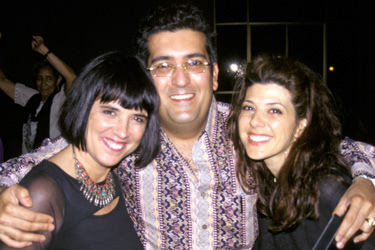Kaizaad Kotwal, Wabash ’91, founded Poor-Box Productions in 1996 with the goal of producing thought-provoking plays and films. Thanks to his pioneering production in India of Eve Ensler’s The Vagina Monologues beginning in the spring of 2003, he’s also raising that country’s awareness of violence against women.
"We have stumbled into being activists," says Kotwal, an actor, filmmaker, Emmy winner, and now theater professor at Ohio State University in Marion.
"This is not what I set out to do when we got the rights to the play. I wanted to produce it because it’s a good play, very well-written."
 The show has consistently sold out since it premiered in Bombay in March 2003 and in the spring of 2004, Kotwal worked with Academy Award-winning actresses Jane Fonda and Marisa Tomei, who joined the cast as guest performers.
The show has consistently sold out since it premiered in Bombay in March 2003 and in the spring of 2004, Kotwal worked with Academy Award-winning actresses Jane Fonda and Marisa Tomei, who joined the cast as guest performers.
Kotwal founded Poor-Box while a graduate student at Ohio State, and he has produced a number of plays and films in the Columbus area. In 1997, he began partnering with his mother, actress and director Mahabanoo Mody-Kotwal, to produce plays in India.
"We tend to be drawn to scripts that are socially relevant but have entertainment value," Kotwal says. "A lot of our works have been cutting-edge and are scripts that have not been done in India." Scripts like The Vagina Monologues—based on Ensler’s interviews with more than 200 women about sexuality, violence, and identity—which Kotwal began thinking about staging back in 2001.
"We weren’t quite sure we would be able to do it," he says. "Would anybody finance it? Would there be an audience for it?"
In November of 2001, he applied for the show’s rights, and when the show’s producer pulled out a month before opening night, he took a risky financial step: he and his mother became the show’s sole producers.
Finding a location was another obstacle.
Venue managers cited religious or moral reasons for not wanting the controversial show to be presented. After he found two venues in Bombay willing to present the show, he had difficulty finding performers.
"Through luck and perseverance we found a cast of women, and they’re very, very courageous," Kotwal says. "They had all been warned not to do it."
The effort has been worth it.
"The response has been amazing. Since the play opened in March 2003, every performance has sold out," Kotwal said. "That’s not only incredible for this show, but for any show in Bombay. Our gut feeling was that this show needed to be put on in India, and we were right on the mark."
Ensler’s play has become the catalyst for V-Day, a non-profit corporation that raises awareness of violence against women through benefit performances of Monologues, and in 2004, the playwright selected India as a focus for V-Day events. V-Day India 2004: A Celebration of the Indian Woman Warrior was produced by Poor-Box Productions, and proceeds went to a shelter for women in danger and to an organization that works to improve the health and education of women and their families in Dharavi, a Bombay slum that is the largest in the world.
Negative reactions to the play, which usually center on its use of the word vagina, frustrate Kotwal.
"The play is a way of raising money to support the fight against violence. How can you be against that?" he says. "’Vagina’ is a biological term. We would never ban a play that was called the Heart Monologues. We find obscene a word that refers to the place that gives birth."
Kotwal has been in touch with Ensler and Fonda to discuss potential future projects, including a possible U.S. symposium that would bring Indian and Pakistani women together.
Susan Wittsock writes for OSU Online, Ohio State University.
This story appeared in the Winter 2005 issue of Wabash Magazine
In photo above: Ensler, Kotwal and actress Marisa Tomei